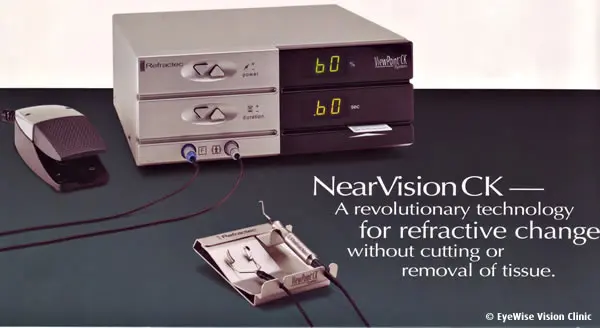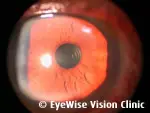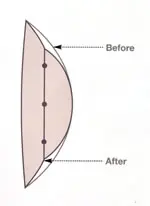Presbyopia Correction
What is Presbyopia?
Everyone starts to lose some near vision when we reach the 40s. This results from the gradual stiffening of the natural human lens in the eye, with a loss of the ability to focus up close as we age. It is a natural part of the ageing process, which progresses until about 60 years of age.
At first, we may start to notice that lighting needs to be bright enough to read fine print. Later, holding things further away may be necessary to read comfortably. In later years, reading aids or surgical options may be necessary.
This age-related vision loss is medically known as Presbyopia. Fortunately, correction and treatment options are available at our eye clinic in Singapore for those experiencing symptoms of presbyopia.
Types of Presbyopia
There are five types of presbyopia:
1. Incipient presbyopia
Incipient presbyopia is the earliest phase of the condition, often manifesting as subtle difficulties in reading small text or seeing fine details. It’s a warning sign that your eyes are losing their ability to focus on close-up objects.
2. Nocturnal presbyopia
Nocturnal presbyopia affects your ability to focus on close-up objects in low-light or nighttime conditions. If you find it challenging to read or perform close-up tasks in dim light, consider presbyopia correction from an eye specialist.
3. Premature presbyopia
Premature presbyopia occurs before the typical age of 40. Factors like nutritional deficiencies, extensive use of near-vision, and certain health conditions like diabetes can contribute to its early onset. If you experience near-vision issues earlier than expected, consult an eye specialist for diagnosis and correction options.
4. Functional presbyopia
Functional presbyopia is when the need for presbyopia correction becomes more apparent. At this stage, you may find daily tasks like reading or using your smartphone increasingly difficult. This may be a clear sign that presbyopia treatment or presbyopia surgery may be necessary to help you manage your day-to-day activities.
5. Absolute presbyopia
Absolute presbyopia is the most advanced stage, requiring immediate presbyopia correction. At this point, the eye completely loses its ability to focus on near objects. Presbyopia correction surgery or other presbyopia treatment options are recommended to help maintain near vision.
For presbyopia correction, the doctor will first test your eyes for the severity and then suggest an appropriate treatment plan to manage the condition.
Symptoms of Presbyopia
Recognising the early symptoms of presbyopia can help you seek timely treatment and maintain your quality of life. Here are some of the most common symptoms:
- Difficulty reading fine print: Struggling to read small text, especially in dim light.
- Eye strain: Experiencing eye fatigue when reading or doing close-up work.
- Holding objects farther away: Needing to extend arms to make reading material clearer.
- Frequent headaches: Experiencing headaches after reading or close-up work.
- Double vision: Seeing double when focusing on close objects.
These symptoms can vary in severity and may require different presbyopia treatments, including surgery to correct presbyopia. If you are experiencing symptoms of presbyopia, get an eye examination at our eye care clinic in Singapore today.
Causes of Presbyopia
When you reach the age of 40, your eyesight starts to deteriorate. This is because the lenses in your eyes become less flexible, making it difficult for you to focus on close objects. Presbyopia is a natural part of the ageing process and affects everyone to some degree. Several other factors that can contribute to presbyopia, including diabetes, high blood pressure, cataracts, or glaucoma. If you have any of these conditions, you may be more likely to develop presbyopia at an earlier age. However, timely treatment for presbyopia can prevent the condition from getting worse.
Checks and Diagnosis of Presbyopia
Diagnosing presbyopia involves a series of tests conducted by an eye specialist. Here’s what to expect:
1. Initial consultation
The eye specialist will begin the consultation by asking you about any vision issues you’ve noticed, such as difficulty reading small text or eye strain.
2. Medical history review
A review of your medical history, including any medications you’re taking or other eye conditions you have, will be conducted to rule out other potential causes of vision problems.
3. Visual acuity test
This is a standard eye chart test. You’ll be asked to read letters from a distance to evaluate your ability to see clearly at various distances. This helps in gauging the extent of your near-vision difficulties.
4. Refraction assessment
In this test, you’ll look through a device known as a phoropter, which contains various lens options. The eye specialist will switch between lenses to find the prescription that offers you clear vision, helping to quantify the degree of presbyopia correction needed.
5. Slit-lamp examination
Using a slit lamp, the eye specialist will examine the structures at the front of your eyes. This device provides a magnified view, allowing the specialist to assess the health of your eye’s lens and other front structures.
6. Discussion of findings
Once all tests are complete, the eye specialist will discuss the results with you. If presbyopia is confirmed, they will explain the severity of your condition and what that means for your daily life.
7. Treatment recommendations
The eye specialist will outline suitable presbyopia correction options based on the diagnostic findings. These could range from bifocal spectacles to presbyopia treatment surgery.
Understanding each step of this diagnostic process can help you feel more prepared and informed when you go for your eye examination. Consultation with an eye specialist is crucial for the proper diagnosis and to explore available options for presbyopia correction in Singapore.
Read More
1. Bifocal spectacles
Bifocal spectacles are a widely used option for presbyopia correction. These glasses feature two distinct optical zones: the upper part is for distance vision, and the lower is for near vision. This dual functionality lets you switch focus between distant and close-up objects without changing glasses.
While some individuals with myopia might find relief by simply removing their glasses for close-up tasks, bifocal spectacles offer a more versatile solution. They are useful for those with both presbyopia and other refractive errors like myopia or hyperopia.
2. Bifocal and multifocal contact lenses
Alternative nonsurgical methods involve bifocal or multifocal contact lenses, and contact lenses worn for an optical approach called “monovision”. Essentially, this calls for full optical presbyopia correction with a contact lens in the master eye, with slight under-correction in the other eye, leaving a low amount of myopia or short-sightedness. This low amount of myopia allows clear near vision.
3. Implantation of multifocal lenses
Cataract surgery is the most recommended procedure for presbyopia correction (when cataracts are already present). The clouded lens is replaced with a multifocal lens, allowing for clear distance, intermediate, and near vision. This prevents the worsening of presbyopia as it is corrected at the level of the lens implant.
When to have implantation of multifocal lens?
If you already have cataracts, then the option for presbyopia would be cataract surgery with the implantation of multifocal lenses. These lens implants will help your distance and near vision, similar to what you were used to in your 30s, without the need for glasses.
If you have dry eyes or other problems making contact lenses unsuitable for you and would still like to be without glasses, here are some suitable options for you.
Pre-Presbyopia Surgery Preparation
Before undergoing eye surgery for presbyopia, it’s necessary to consult with your ophthalmologist for a comprehensive eye exam to assess your suitability for the procedure. Your eye doctor may advise you to stop wearing contact lenses a week prior to the evaluation to ensure your cornea’s shape is in its natural state. Blood tests and other medical evaluations may also be required to ensure you’re fit for surgery.
Post Presbyopia Surgery Guidelines And Recovery
Post presbyopia correction surgery, your eye doctor will prescribe specific eye drops, both antibiotic and anti-inflammatory, to ward off infection and control swelling. But it’s not just about following a medication schedule; it’s about lifestyle adjustments, too. For instance, you must avoid strenuous activities and screen time to let your eyes heal. Regular follow-up appointments are opportunities to catch any complications early. Having someone assist you in the initial days post-surgery is also advisable as your vision stabilises.
Possible Risks and Side Effects of Presbyopia Surgery
- Dry Eyes: A common but usually temporary side effect of presbyopia surgery, dry eyes can cause discomfort and may require lubricating eye drops for relief.
- Glare and Halos: Patients may experience increased sensitivity to light, resulting in glare or halos around light sources, particularly in low-light conditions.
- Infection: While rare, post-operative infections are a serious concern that necessitates medical attention to prevent further complications.
- Corneal Haze: This involves a temporary cloudiness in the cornea that can affect vision quality. It usually resolves on its own but may require treatment in persistent cases.
- Epithelial Ingrowth: This involves the growth of corneal epithelial cells under the flap created during surgery, which may require additional surgical intervention.
Get professional eye care treatments from our eye specialists at EyeWise Vision Clinic. Beyond presbyopia correction, we offer various other eye care services, including diabetic eye screening, dry eye treatment, glaucoma surgery, and more.
Take the first step towards comprehensive eye health by booking an appointment today.
Read More
About Dr Christopher Khng
Dr. Christopher Khng specialises in Complex Cataract and Anterior Segment Reconstruction Surgery, particularly Iris Reconstruction and Surgery for Aniridia. His other areas of expertise include Complex Lens surgery, New Lens and Phacoemulsification technologies, Refractive surgery, Phakic IOLs (the Implantable Collamer Lens, ICL), and small-incision, topical anaesthesia phacoemulsification cataract surgery.
He completed his first two years of medical undergraduate studies at Aberdeen University, Scotland (UK). Because of cost, he completed his medical degree of MBBS at the National University of Singapore (NUS).
Dr. Khng served as Registrar, then Associate Consultant Ophthalmic Surgeon at the Singapore National Eye Centre (SNEC). Following his stint in SNEC, Dr. Khng was a Consultant at The Eye Institute, Tan Tock Seng Hospital, Singapore.
Dr. Khng’s interest in correcting Presbyopia employs a multi-faceted approach, including progressive lens implant technologies and surgical methods like corneal inlays and monovision strategies. By conducting thorough pre-operative assessments, he provides treatment plans to match each patient’s visual requirements and lifestyle needs. His approach aims to help near vision and reduce the reliance on reading glasses, offering a more functional range of vision for daily activities.

Dr Christopher Khng
MBBS, M.Med(Ophth), FRCS(Edin), AMS(Ophth 2003) Consultant Ophthalmologist
Frequently Asked Questions About Presbyopia Correction
How quickly does presbyopia progress?
Several factors that can affect how quickly presbyopia progresses, including the health of the eyes and the overall health of the individual. Typically, presbyopia progresses slowly and steadily over time. However, it is recommended to see a doctor as soon as you start noticing symptoms of presbyopia so that a treatment plan can be provided to prevent the condition from deteriorating further.
Can presbyopia be corrected with eye surgery?
Cataract surgery is the most common and recommended treatment for presbyopia. Presbyopia occurs with age when you start losing the ability to focus on near objects. This happens due to the natural ageing of the lens inside the eye, which becomes harder and less elastic over time. Today, with technological advances, it has become possible to treat presbyopia with cataract surgery through multifocal lens replacement.
Which eye surgery is suitable for presbyopia?
Eye doctors can perform various types of eye surgery for presbyopia correction, including cataract surgery, refractive lens exchange and others. Which type of surgery is suitable for correcting presbyopia for you will depend on your individual needs and preferences. For an evaluation of your eye condition and presbyopia correction, book an appointment at our clinic in Singapore.
What are the differences between bifocal spectacles and multifocal contact lenses for presbyopia correction?
Bifocal spectacles feature two distinct zones, each designed for a specific range of vision—distance or near. A visible line separates these zones, and the wearer switches focus by looking through the appropriate zone. Multifocal contact lenses, on the other hand, transitions between multiple focal lengths, providing a more fluid and natural visual experience. The choice between these two presbyopia correction options often depends on individual comfort and lifestyle needs.
Are there any non-age-related factors that can accelerate the development of presbyopia?
Indeed, non-age-related factors like uncontrolled diabetes, cardiovascular diseases, and certain medications such as antihistamines and antidepressants can hasten the onset of presbyopia. Additionally, occupations or activities that require prolonged close-up focus can contribute to the earlier development of the condition.
Is monovision a suitable approach for all individuals with presbyopia?
Monovision is a specific presbyopia correction option where one eye is adjusted for distance vision and the other for near vision. While it offers an alternative to presbyopia surgery, it’s not suitable for everyone. Issues such as compromised depth perception and visual clarity may arise, requiring an adaptation period. For personalised presbyopia treatment in Singapore, consult EyeWise Vision Clinic’s team of eye specialists.
What are the differences in outcomes between cataract surgery and refractive lens exchange for presbyopia?
Cataract surgery primarily contributes to clear vision by removing a cloudy lens and replacing it with a monofocal intraocular lens (IOL). Refractive lens exchange, on the other hand, focuses on addressing presbyopia by replacing the eye’s natural lens with a multifocal or accommodating IOL, resulting in clear vision at various distances. This key distinction in outcome makes refractive lens exchange a specialised option for individuals seeking a broader range of vision correction.



